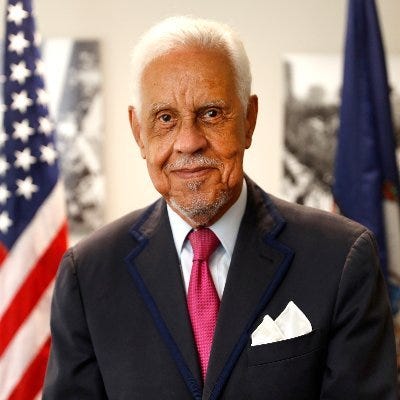Lawrence Douglas Wilder
First African American Governor, USA
Lawrence Douglas Wilder: From Humble Beginnings to Historic Heights
Lawrence Douglas Wilder, born in Richmond, Virginia, on January 17, 1931, carved his name in history as the first African American elected governor of a U.S. state. His journey, woven from humble beginnings, a fierce intellect, and unwavering determination, serves as an inspiration for generations to come.
Early Life and Education:
Wilder's childhood was shaped by segregation and Jim Crow laws. Despite these challenges, he excelled academically, graduating from Virginia Union University with a degree in chemistry. Driven by a thirst for knowledge and a desire to break barriers, he served in the Korean War before pursuing law at Howard University. He earned his law degree in 1959 and returned to Richmond to establish his practice, becoming one of the city's first Black attorneys.
Political Ascent:
Wilder's legal understanding and passion for justice soon found their way into the political arena. He won a seat in the Virginia State Senate in 1969, becoming the first African American to do so since Reconstruction. Over the next 16 years, he championed civil rights reforms, fought for educational equality, and challenged the vestiges of racial discrimination.
Making History:
In 1989, Wilder's name echoed nationwide when he announced his candidacy for governor of Virginia. His campaign, infused with a message of unity and progress, resonated with voters across racial and demographic lines. On November 7, 1990, history was made. Wilder, with 51.5% of the vote, became the first African American elected governor of any U.S. state.
Governor Wilder:
Both challenges and triumphs marked Wilder's governorship. He navigated a divided legislature, tackled a budget deficit, and worked to expand access to healthcare and education. He faced criticism for some of his policies, but his unwavering commitment to progress and historic stature remained unchallenged.
Beyond the Governorship:
After leaving office in 1994, Wilder continued to be a prominent figure in public life. He served as mayor of Richmond from 2005 to 2009, proving his dedication to his hometown. He also remained active in academia, lecturing and writing about politics, race, and social justice.
Legacy of a Trailblazer:
Lawrence Douglas Wilder's life and career stand as a testament to the power of perseverance, the importance of education, and the enduring fight for equality. He shattered racial barriers in politics, paved the way for future generations of leaders, and forever changed the landscape of American history.
Wilder's legacy extends far beyond his political achievements:
He inspired countless young people, particularly African Americans, to pursue public service careers and believe in the power of their voices.
He demonstrated that leadership transcends racial divides and that progress can be achieved through dialogue and understanding.
He challenged America to confront its racial injustice history and strive for a more equitable future.
Lawrence Douglas Wilder's story is a powerful reminder that even the most daunting obstacles can be overcome with dedication, courage, and unwavering belief in a better tomorrow. His legacy inspires generations to fight for justice, equality, and a brighter future for all.


